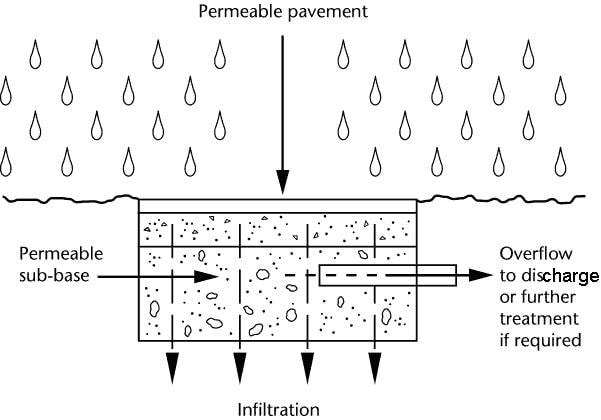SuDS to become mandatory in England

Why now?
Back in November 2022 the National Infrastructure Commission (NIC) recommended urgent government action to reverse the sealing up of our towns and cities. Quite simply there are too many places where the existing storm drains cannot cope when faced with major storm events.
According to Professor Jim Hall, National Infrastructure Commissioner, “It’s clear that faced with more intense rainfall and increased urbanisation, we need to start taking this type of flooding far more seriously.
“The solution is clear – reducing the amount of water flowing into drains, whilst also improving the capacity of those drains. That means stopping urban creep from increasing the amount of storm water that drainage systems have to cope with and giving nature more opportunities to hold on to excess water, as well as targeted investment to ensure sewers can cope with growing pressures.”
How?
The legislation is already in place with ‘The Flood and Water Management Act 2010’ which includes provisions to make SuDS mandatory on developments with approval by local authority ‘SuDS Approving Bodies’, or SABS. Wales has already implemented this under Section 3 of the act, but England has not; but that is about to change.
It’s fair to say that the government has come under intense pressure as a result of major flood events over the last few years, so now it is moving towards implementing these measures.
When will it be implemented?
At the moment the government and various bodies are working through the details of what will be implemented.
The NIC recommends that the government implements Schedule 3 of the act by the end of 2023, so it’s reasonable to assume that SuDS will become mandatory early next year.
What will be implemented?
While the details are being ironed out, the NIC makes the following recommendations in its report:
- Reduce the amount of run-off water entering drainage systems– government should strengthen legislation and standards to discourage new developments from connecting to existing drainage infrastructure in favour of wider uptake of sustainable systems, and review options for managing the unplanned growth of impermeable surfaces;
- Expand the capacity of drainage systems – better maintenance of existing drainage networks and expanding the use of lower cost above ground measures (such as channels and drains) should be considered before new pipes and sewers, and priority should be given to nature-based solutions such as roof gardens, drainage ponds and rain gardens. Ofwat should ensure that water and sewerage companies play their part, by enabling efficient investment in both above and below ground drainage infrastructure;
- Create more joined-up, targeted governance and funding – the Environment Agency should be actively involved in assessing surface water flood risk and government should set national risk reduction targets. Local authorities and water companies should then work together to develop fully costed joint plans which deliver locally agreed targets, with public funding devolved to local areas.
What will this mean for me?
Whether you are a specifier, property developer or contractor you will need to get up to speed with SuDS quickly. The direction of travel is clear and soon you will have no choice but to implement such systems.
One issue is a real skills gap in industry, which means that if you have the skills, you can expect more work. Alternatively, if you don’t, then any projects you have for next year could get delayed. Either way you need to invest in the skills you need now before it is too late.
How do I find out about SuDS?
Fortunately, there is help and guidance already available. CIRIA produces ‘The SuDS Manual’ which is the essential guide on the subject. Dating from 2015, the organisation is now planning a new edition in anticipation of the legislation change, but in the meantime its existing guide is the best place to start.
There are of course also numerous CPD training courses covering SuDS both from CIRIA and also free training CPDs from manufacturers of permeable paving such as ourselves.
Our free CPD session provides a thorough understanding of the role of permeable paving in sustainable drainage projects. Find out more here.
SUDS TO BECOME MANDATORY IN ENGLAND
This blog is based upon the content from our RIBA approved CPD seminar “Permeable Paving.” To demonstrate your understanding complete the following questions to receive your certificate.
To find out more about sustainable urban drainage systems and the role of permeable paving in such systems take a look at our RIBA approved “Permeable Paving” CPD.
